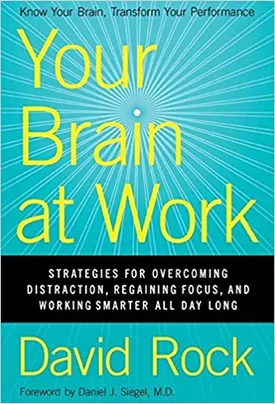Your Brain at Work: Strategies for Overcoming Distraction, Regaining Focus, and Working Smarter All Day Long by David Rock
In his book Your Brain at Work, David Rock proposes an innovative look at how people can effectively understand and manage their own brains at work. By presenting practical strategies that are easy to use, Rock provides guidance to people on how to regain focus, maintain motivation and be more productive.
The central message of Rock’s book is that “your attention determines your reality”. He suggests that by managing our attention better, we can make better decisions and be more productive. He calls this “smart energy management”, and he equips his readers with the tools they need to be successful.
The book begins with Rock’s description of his own struggles with focus and attention while trying to work. He explains how his own lack of motivation was causing him to feel overwhelmed and frustrated. By becoming aware of his own attention deficits and bad habits, he built a better understanding of his own brain and was able to start taking steps to improve his focus and motivation.
Rock then explains how our brains are bombarded with information from the environment: phones, emails, conversations and other distractions. He suggests that the key to managing these distractions is to separate our attention and direct it to the most important task at hand. In order to accomplish this, Rock proposes strategies such as chunking work into smaller tasks, focusing on one task before moving onto the next and taking regular breaks. He also encourages readers to leverage their emotions in order to focus better and be more productive.
Throughout the book, Rock also explores how different emotional states can affect our performance. He explains that our brains can be easily hijacked by emotion, and how this can lead to poor decision-making. By learning how to identify these emotional hijackings and learning how to regulate them, Rock argues that readers will be able to increase their focus and productivity.
Rock also introduces techniques such as ‘pause and scan’ and the ‘neural recycle bin’ which encourage readers to make better decisions and become more aware of their attention. By becoming aware of the patterns of their thinking, readers are more likely to make decisions that are in alignment with their values.
Lastly, Rock suggests that by consciously tuning into our subtle thoughts, we have the capacity to increase our performance and satisfaction. By understanding our attention and emotions, Rock argues that we can become aware of our own limitations and become better equipped to make better decisions in our lives.
In conclusion, David Rock’s book Your Brain at Work provides pragmatic strategies that anyone can use to help better manage their attention and focus, leading to improved motivation and productivity. By introducing strategies and techniques to manage our emotions and attention, Rock gives readers the tools they need to make better decisions and become more successful at work.

